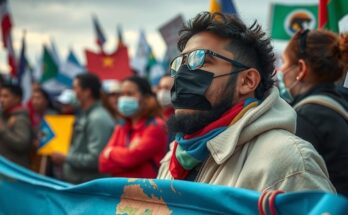African leaders reacted strongly to the UN COP29 agreement, labeling the $300 billion climate finance goal as inadequate and reflective of climate colonialism. Greenpeace representatives criticized the agreement for perpetuating historical injustices, while endorsing a united front against insufficient climate action in the face of severe environmental challenges, signaling the urgency for meaningful commitments ahead of COP30 in Belem.
The conclusion of the UN Climate Change Conference COP29 in Baku has incited significant backlash from African leaders, who criticized the inadequate climate finance goal of $300 billion USD in light of the $1.3 trillion needed for climate-vulnerable communities. Fred Njehu, a Pan-African Political Strategist at Greenpeace Africa, characterized the proposed financial support as “climate colonialism,” highlighting the gross disparity between the needs of affected African nations and the offerings from the Global North. He emphasized that while Africa suffers from climate-related disasters, wealthy nations continue to prioritize profits from fossil fuels over genuine support for recovery and resilience, branding the financial commitment as a profound historical injustice. Dr. Lamfu Yengong, an expert on Africa’s Congo Basin, condemned the carbon trading mechanisms agreed upon during the conference, viewing them as neo-colonial. He asserted that such schemes allow affluent nations to buy carbon credits rather than making substantive reductions in emissions, subsequently disregarding the needs of African communities. Jasper Inventor, head of Greenpeace’s delegation, deemed the finance goal insufficient and criticized the political inertia that has hampered substantial progress at the conference, calling for a collective stand against fossil fuel influences in political decision-making. “People are fed up and disillusioned, but we will persist and resist because this is a fight for our future,” he stated, reinforcing the commitment to demand greater climate ambition at future discussions.
The topic revolves around the aftermath of COP29, a significant platform for global climate discussions where nations convene to address climate change commitments and finance. In this year’s conference, the underwhelming agreement on climate finance for vulnerable communities sparked criticism, particularly from African leaders who argued that such actions resemble climate colonialism. The cumulative sentiment expresses disappointment regarding the lack of substantial financial support and effective climate action, particularly in contrast to the ongoing climate adversities faced by many African nations due to the historical actions of wealthier countries.
In summary, the outcomes of COP29 have drawn sharp criticism from African leaders who view the agreed-upon climate finance and market mechanisms as insufficient and indicative of ongoing inequities in global climate negotiations. Prominent figures from Greenpeace Africa have articulated a clear message: real climate action should prioritize sustainable development and genuine financial investments to support those affected by climate change. The demand for accountability from the Global North remains paramount as Africa prepares for COP30 in Belem, signaling a steadfast commitment to environmental justice and equitable climate solutions.
Original Source: www.greenpeace.org




